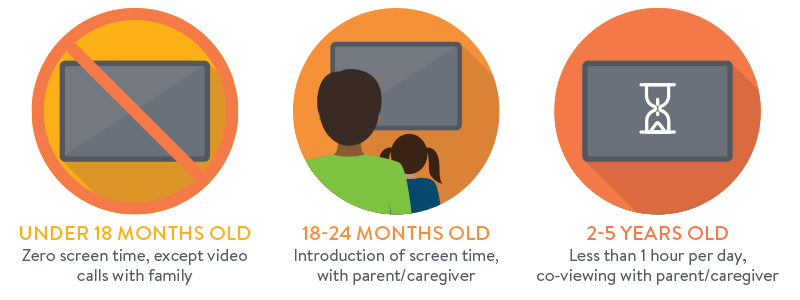
What is considered screen time for babies and toddlers?
Screen time, or digital media, refers to the use of smart phones, tablets, computers, and TVs.
What is the current screen time recommendation for babies and toddlers?
The American Academy of Pediatrics (AAP) has established screen time recommendations for children. Parents and caregivers should co-view digital media with babies and toddlers to help them understand what they are seeing and apply what they are learning to the world around them.
- Babies under 18 months of age: Zero screen time outside of video calls with friends and family
- Toddlers 18-24 months: Can be introduced to age-appropriate digital media in small amounts
- Children 2-5 years old: No more than one total hour of screen time per day
Why is it best to set screen time limits?
Screen time can negatively affect both your child’s development and physical health. Babies and toddlers need hands-on exploration and social interaction with trusted caregivers to develop their cognitive, language, motor, and social-emotional skills. These skills cannot be learned through digital media.
A link has also been found between screen time use and language delay. An expressive speech delay can influence a child’s ability to conceptualize words or define their emotions, leaving them frustrated and more likely to act out. Additionally, the use of screens early on can lead to attention difficulties.
Finally, screen time can impact physical health and sleep. Screen time is often accompanied by mindless eating and often displaces time spent doing physical activity, which has been linked to obesity later in life. An increased duration of media exposure and a presence of digital media in the bedroom are associated with fewer minutes of sleep per night.
Screen Time Recommendations
- Choose high quality media options that display both words and visuals to support learning. CommonSenseMedia.org is a great resource for navigating age-appropriate media
- Create a Family Media Plan
- Try interactive programs that use touchscreens to facilitate learning
- Avoid fast paced programs
- Avoid apps with distracting content
- Avoid any violent content
- Turn off devices when they are not in use, and store them in a place where kids can’t get them without adult permission
- Avoid using media as a way to calm your child. Children need to learn to self soothe
- Monitor children’s media content and what apps are used or downloaded
- Keep bedrooms and parent-child playtimes screen-free
- Keep mealtimes screen-free. Kids need to learn to feel hungry and full, and watching media will distract them from this feeling
- Avoid screens 1-2 hours before bedtime and remove devices from bedrooms before bed
Keep Reading
View All Posts
Drive-Thru Vaccine Clinics
Online scheduling is now available for our Drive-Thru Vaccine Clinics this fall!

Tips for Navigating Flu Season
Getting a flu vaccine is one of the most effective ways to prevent the spread of influenza and reduce the risk of complications.

Drive-Thru Vaccine Clinic Information
Please read these important details before arriving at your Drive-Thru Vaccine Clinic appointment!

